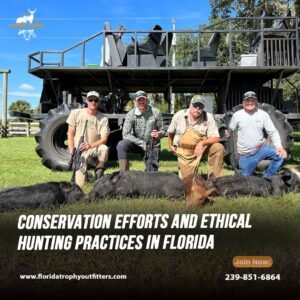
Hunting is more than a sport in Florida—it’s a tradition that connects people to the great outdoors. But with this privilege comes responsibility. Conservation efforts and ethical hunting practices play a vital role in preserving Florida’s wildlife and natural ecosystems for future generations.
From the swamps teeming with alligators to the forests home to Osceola turkeys and white-tailed deer, Florida’s diverse habitats require careful management to maintain their delicate balance. In this blog, we’ll explore how hunting supports conservation, why ethical practices matter, and how hunters can contribute to protecting Florida’s natural beauty.
The Role of Hunting in Conservation
It may surprise some to learn that hunting, when done responsibly, is a cornerstone of conservation. By regulating wildlife populations and funding habitat preservation, hunting ensures the health of ecosystems while minimizing human-wildlife conflicts.
How Hunting Supports Conservation in Florida
- Wildlife Management:
Florida’s wildlife agencies, like the Florida Fish and Wildlife Conservation Commission (FWC), use hunting to control populations of certain species. Overpopulation can lead to habitat destruction and disease spread, which hunting helps mitigate. - Funding Conservation Programs:
Every hunting license and permit purchased directly supports conservation initiatives. Through programs like the Pittman-Robertson Act, a portion of hunting-related purchases (like firearms and ammunition) funds wildlife restoration, research, and habitat protection. - Invasive Species Control:
Species like wild hogs cause extensive damage to Florida’s natural habitats. Hunters play a crucial role in controlling these populations, preventing further harm to native plants and animals.
What Are Ethical Hunting Practices?
Ethical hunting goes beyond following the law—it’s about showing respect for wildlife, the environment, and fellow hunters. Here are some core principles of ethical hunting:
1. Fair Chase
Ethical hunting emphasizes the concept of a fair chase, meaning the animal has a fair opportunity to escape. This ensures a balanced and sporting pursuit, avoiding methods like baiting (where prohibited) or hunting confined animals.
2. Respect for Wildlife
Ethical hunters prioritize humane practices, such as:
- Ensuring a quick, clean kill to minimize suffering.
- Avoiding unnecessary waste by utilizing as much of the animal as possible, including meat and hides.
3. Following Laws and Regulations
Adhering to Florida’s hunting laws, including licensing, bag limits, and seasonal restrictions, is fundamental to ethical hunting.
4. Safety First
Responsible hunters always prioritize safety—for themselves, their companions, and others in the area. This includes proper firearm handling and wearing visible gear in shared hunting zones.
Conservation Challenges in Florida
Florida’s unique environment faces several challenges that require both hunters and conservationists to work together:
1. Habitat Loss
Urban development continues to shrink natural habitats, threatening wildlife populations. Hunters can support organizations that purchase and protect land for conservation.
2. Invasive Species
Invasive species like Burmese pythons and wild hogs disrupt native ecosystems. Licensed hunters can participate in specialized hunts to help control these populations.
3. Balancing Ecosystems
Overpopulation of certain species can strain resources, while underpopulation can lead to genetic bottlenecks. Hunters help maintain this balance under the guidance of wildlife agencies.
How Florida Promotes Ethical Hunting and Conservation
Florida takes conservation seriously, offering various programs and initiatives to support sustainable hunting practices:
- Wildlife Management Areas (WMAs):
Florida’s WMAs provide nearly 6 million acres of public land for hunting, ensuring habitats are managed responsibly and sustainably. - Hunter Education Programs:
The FWC offers hunter safety courses to educate participants about ethical hunting, conservation, and safety. - Incentive Programs:
Programs like Youth Hunts encourage younger generations to learn about responsible hunting, fostering a culture of conservation.
How Hunters Can Contribute to Conservation
If you’re passionate about ethical hunting and protecting Florida’s wildlife, here’s how you can contribute:
- Buy Licenses and Tags:
Every license and tag purchased helps fund conservation programs. - Participate in Invasive Species Hunts:
Join organized hunts for wild hogs or pythons to protect native ecosystems. - Follow Leave No Trace Principles:
Leave hunting areas as pristine as you found them—clean up after yourself and respect nature. - Support Conservation Organizations:
Contribute to groups like the National Wild Turkey Federation (NWTF) or Ducks Unlimited, which work to preserve habitats. - Mentor New Hunters:
Teach newcomers about ethical practices and the importance of conservation to ensure these values are passed down.
Why Ethical Hunting Matters
Ethical hunting is about more than just following rules—it’s a commitment to preserving Florida’s unique ecosystems while enjoying the thrill of the hunt. By balancing tradition with responsibility, hunters can help ensure that Florida’s wildlife thrives for generations to come.
Join Us for a Guided Ethical Hunt
At Florida Trophy Outfitters, we’re proud to promote responsible hunting practices and provide guided experiences that respect nature and support conservation. Whether you’re hunting wild hogs, Osceola turkeys, or alligators, our expert guides will ensure your hunt is safe, ethical, and unforgettable.

